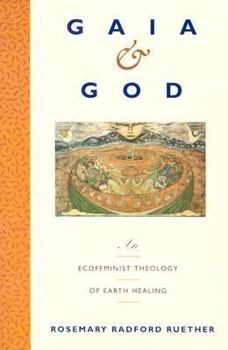Gaia and God: An Ecofeminist Theology of Earth Healing
Select Format
Select Condition 
Book Overview
Internationally acclaimed author and teacher Rosemary Radford Ruether presents a sweeping ecofeminist theology that illuminates a path toward earth-healing--a whole relationship between men and women, communities and nations. This is theology that really matters.--Harvey Cox
Format:Paperback
Language:English
ISBN:0060669675
ISBN13:9780060669676
Release Date:May 1994
Publisher:HarperOne
Length:324 Pages
Weight:0.63 lbs.
Dimensions:0.8" x 5.2" x 8.2"
Customer Reviews
1 rating
Must-read for those interested in an ecologically sound theology
Published by Thriftbooks.com User , 17 years ago
Professor Ruether's dense and challenging book is a must-read for progressive Christians (and other disciples of Jesus) interested in developing an ecologically sound theology. As she makes abundantly clear in the final section of the book, "there is no ready-made ecological spirituality and ethic in past traditions. The ecological crisis is new to human experience...The radical nature of this new ecological devastation means that all past human traditions are inadequate in the face of it. Whatever useful elements may exist...must be reinterpreted to make them usable in the face of both new scientific knowledge and the destructive power of the technology it has made possible" (p. 206). The clarity of her argumentation, the quality of her prose, and the urgency of our current environmental and theological situation make what could be a daunting read into a fair approximation of a page turner. The book itself is divided into four sections---Creation, Destruction, Domination and Deceit, and Healing---and in each section Ruether sketches the different lines of myth and metaphor that have shaped and continue to shape our relationships with one another and with the living earth as a whole. "Creation" begins with the Babylonian, Jewish, and Platonic Greek creation stories, in which nature and the feminine are conceived of as the threatening "Other" in need of suppression by a transcendent (male) ego. This section concludes with the post-Newtonian perspectives of quantum mechanics, ecology, and other contemporary scientific cosmologies that seem to imply a re-integration of the observer ("man") with the observed ("nature"). Ruether feels that this latter "creation myth" needs to become the new basis for our theologies. "We need scientist-poets who can retell the story I have alluded to in this chapter, the story of the cosmos and the earth's history, in a way that can call us to wonder, to reverence for life, and to the vision of humanity living in community with all its sister and brother beings" (p. 58). This language is hardly that of traditional Christian theology, and yet the need for a language of wonder and reverence that is not inextricably connected with 2,000-year old myths and legends is, to me, self-evident. "Destruction" explores and interrogates Jewish and Christian themes of the End Times, and then examines the converging contemporary catastrophes facing humanity and the entire global biosphere. Are these myths and realities related, and if so, how? In the traditional views, good and evil tend to be understood in tribal terms, and so the response to "evil" often takes the place of total, absolute enmity towards different genders, religions, ethnicities, races, etc. "The impulse to apocalyptic thus becomes genocidal, the extermination of those people who are seen as 'Satan's people.'...Massacres of the enemy through military weapons, ranging from the sword to nuclear bombs, are fantasized by apocalypticists as instruments of righteousne






